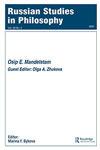Dostoevsky’s Philosophical Universe
IF 0.1
4区 哲学
Q4 Arts and Humanities
引用次数: 1
Abstract
Fyodor Dostoevsky, whose 200th birthday we celebrated in 2021, is perhaps one of the most eminent Russian thinkers. A giant of nineteenth-century literature, Dostoevsky became a symbol of Russian culture. Not only did his contemporaries view him as a Russian national prophet, but also his novels and other literary writings greatly affected the way in which Russia would think of itself in the years following his death. This manifestly points to the important place that Dostoevsky rightly holds in the cultural heritage of Russia. Hence, it is not surprising that now—in the wake of the Russian unprovoked invasion of Ukraine—he, along with other famous Russian literary and cultural figures, has emerged as a target of the growing number of calls for canceling Russian culture. The current widespread attempt at “total disengagement” from Russia has led many to boycott musicians, artists, writers, and other cultural figures who have been associated with Russia at any time in history. Even those who died decades, or even centuries, before the shaping of Russia’s current political regime and those responsible for the present-day atrocities, are openly being blamed for the war in Ukraine and accused of being instrumental to cultivating the hostile ideology of the “Russian world.” Dostoevsky and his legacy have not been spared from this predicament as well. To be sure, the recently developed dismissive attitude toward the author of widely known and loved novels such as The Brothers Karamazov and Crime and Punishment may not be fully ungrounded, and not simply because Putin happened to list Dostoevsky as one of his favorite authors. More worrisome is Dostoevsky’s own support and open advocacy for PanSlavism, a nationalistic ideology that argues for integration and unity of the Slavic peoples and states under the great patronage of Russia to counter the expansion of the West. Formed into a political movement, Pan-Slavism rose陀思妥耶夫斯基的哲学宇宙
费奥多尔·陀思妥耶夫斯基可能是俄罗斯最杰出的思想家之一,我们在2021年庆祝了他的200岁生日。作为十九世纪文学的巨人,陀思妥耶夫斯基成为俄罗斯文化的象征。他的同时代人不仅将他视为俄罗斯民族先知,而且他的小说和其他文学作品也极大地影响了俄罗斯在他去世后的几年里对自己的看法。这显然表明了陀思妥耶夫斯基在俄罗斯文化遗产中的重要地位。因此,在俄罗斯无端入侵乌克兰之后,他和其他著名的俄罗斯文学和文化人物一起,成为越来越多要求取消俄罗斯文化的呼声的目标,这并不奇怪。目前,人们普遍试图“完全脱离”俄罗斯,这导致许多人抵制历史上任何时候与俄罗斯有联系的音乐家、艺术家、作家和其他文化人物。即使是那些在俄罗斯现政权形成前几十年甚至几个世纪去世的人,以及那些对当今暴行负有责任的人,也被公开指责为乌克兰战争的罪魁祸首,并被指责为培养“俄罗斯世界”的敌对意识形态的工具。陀思妥耶夫斯基和他的遗产也未能摆脱这种困境。可以肯定的是,最近对《卡拉马佐夫兄弟》和《罪与罚》等广为人知、广受喜爱的小说的作者产生的轻蔑态度可能并非完全没有根据,这不仅仅是因为普京碰巧将陀思妥耶夫斯基列为他最喜欢的作者之一。更令人担忧的是陀思妥耶夫斯基自己对泛斯拉夫主义的支持和公开倡导,这是一种民族主义意识形态,主张斯拉夫人民和国家在俄罗斯的大力庇护下融合和团结,以对抗西方的扩张。泛斯拉夫主义形成了一场政治运动
本文章由计算机程序翻译,如有差异,请以英文原文为准。
求助全文
约1分钟内获得全文
求助全文
来源期刊

RUSSIAN STUDIES IN PHILOSOPHY
PHILOSOPHY-
CiteScore
0.10
自引率
0.00%
发文量
14
期刊介绍:
Russian Studies in Philosophy publishes thematic issues featuring selected scholarly papers from conferences and joint research projects as well as from the leading Russian-language journals in philosophy. Thematic coverage ranges over significant theoretical topics as well as topics in the history of philosophy, both European and Russian, including issues focused on institutions, schools, and figures such as Bakhtin, Fedorov, Leontev, Losev, Rozanov, Solovev, and Zinovev.
 求助内容:
求助内容: 应助结果提醒方式:
应助结果提醒方式:


